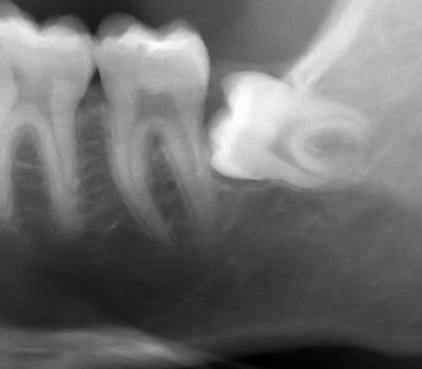Wisdom Teeth

Wisdom teeth, also referred to as third molars, get their name by being the last teeth to come in during young adulthood. As part of a dental visit, we will examine you to determine if your wisdom teeth are healthy and properly positioned.
Many people think that as long as their wisdom teeth don’t hurt, they do not need to be removed. While not all third molars need to be removed, we have found that early removal of wisdom teeth can prevent many problems associated with removal later in life including:
- Cavities or bone loss that may cause you to lose the molars in front of the wisdom teeth
- Root sensitivity since the bone is not as likely to completely re-cover the roots of teeth left after wisdom teeth are removed
- Abscesses in or around wisdom teeth that are difficult to clean even when properly aligned
- Increased recovery time
- Higher incidence of dry socket
- Greater chance of surgical complications
Wisdom teeth that are not removed should continue to be monitored, because the potential for developing problems later on is great. Removing wisdom teeth at a younger age is generally encouraged to avoid the complications above.
Find out more from our Wisdom Teeth Frequently Asked Questions...
Free Consultation
If you’re wondering if you could benefit from wisdom tooth removal, or just want to know if you will have enough room for them to erupt normally, call to schedule a free consultation with us. We’ll let you know what your options are, provide a complete estimate, and help plan a convenient time if removal is needed.
Benefit From Local Support
Dr. Halls is the only local dentist certified to remove wisdom teeth using IV sedation. Local support means that we’ll be here should you need any follow-up care. There is no need to drive back to the Valley or to try to seek help from another dentist who is unfamiliar with your case. We are here for you from start to finish.
Doctors’ Training
Dr. Halls has completed hundreds of hours of additional training beyond dental school. Following dental school, rather than enter private practice, he chose to complete a residency program offered by some of the most qualified specialists available, including advanced training in oral surgery. Following this training, Dr. Halls was assigned to remove wisdom teeth for new Air Force recruits. While there are rare cases that he refers to an oral surgeon, this experience has allowed him to gain the experience necessary to handle surgeries that even include teeth that are completely impacted and hidden in the jaw.
Wisdom Teeth Frequently Asked Questions
Many people wonder why wisdom teeth are often removed—even if they don’t seem to be causing any problems. The truth is that problems may be occurring which aren’t felt until it is too late. For example, wisdom teeth may be positioned so that food and bacteria collect around them but cannot be cleansed. This may cause gum infections that cause loss of the jaw bone or cavities that may lead to the need for root canals or even loss of the molar tooth in front of the wisdom tooth. Waiting for wisdom teeth to hurt before seeking care is simply not wise.
The answer varies for each person, but most surgeons agree that mid-late teens is ideal for most people. This is performed often before the roots of the teeth are fully formed, making the removal less risky and recovery easier. An evaluation during the early teen years can prevent some complications that may result from waiting.
Furthermore, it may be financially wise to have the procedure performed before students lose the insurance coverage they have before they leave home, and scheduling ahead of time can be much more convenient than waiting until a problem arises which may mean missing days of school or work.
Free! If you’re wondering if you could benefit from wisdom tooth removal, or just want to know if you will have enough room for them to erupt normally, we offer a free consultation. We’ll let you know what your options are, provide a complete estimate, and help plan a convenient time if removal is needed.
While each case is different, most patients resume normal activities 3-5 days after surgery.
While some complications may be possible, they are rare. Wisdom tooth removal is a common procedure and is performed to prevent future complications. We’ll be happy to discuss your particular risks that are specific to you during the consultation.
Yes. Soft foods will help prevent damage to the site where the teeth were removed. Ice cream, applesauce, pudding, etc. are excellent choices.
Many people whose teeth are impacted receive sutures that dissolve in the days following surgery.
Usually the answer is no. The majority of people enjoy a trouble-free recovery. However, if you think you might have a dry socket or other questions arise, we make it easy for you to return for care. That’s the beauty of local support. There is generally no additional cost for follow-up care from start to finish.
We understand that each person is unique and we are comfortable offering options tailored to each individual. You may choose to simply have local anesthetic, take a relaxing prescription pill ahead of time, or, like most of our patients, choose the ease of IV sedation to be completely comfortable.
"All services provided by a licensed AZ general dentist"

